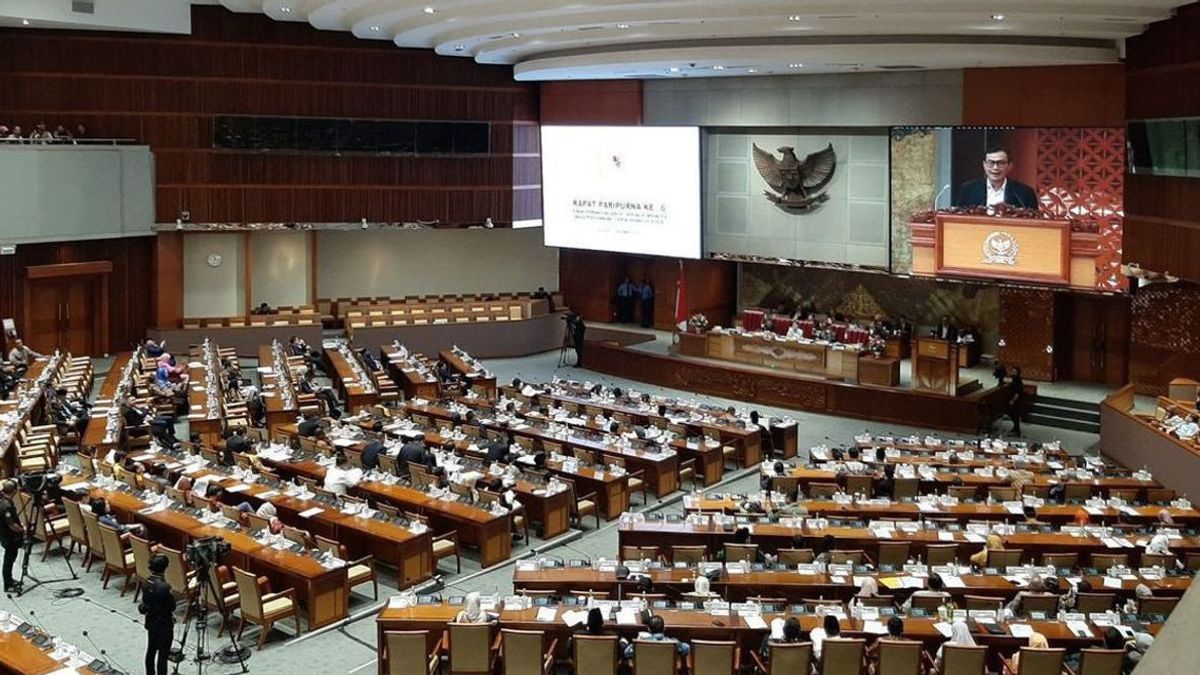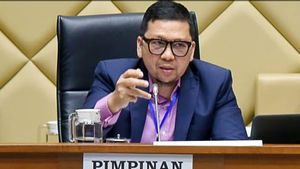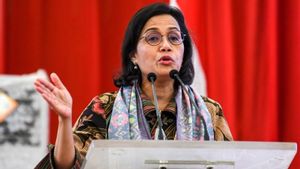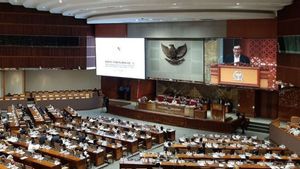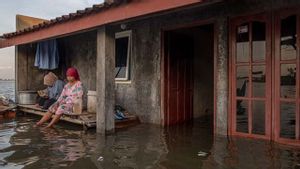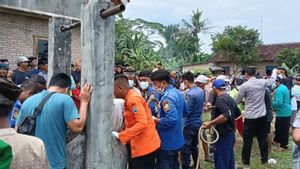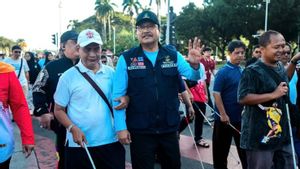JAKARTA - The project to move the nation's capital city from Jakarta to Penajam Paser Utara, East Kalimantan, has entered a new phase after the enactment of the Draft State Capital Law (RUU IKN) into the IKN Law in the plenary meeting of the Indonesian House of Representatives, Tuesday, January 18.
The discussion of this law was fairly fast because it only took 43 days, starting from December 7, 2021, until it was ratified on January 18, 2022.
Now, the plan to move to the capital city of a new country is becoming more and more real. Chairman of the Special Committee for the IKN Bill of the DPR Ahmad Doli Kurnia said the stipulation of the IKN Law provided a guarantee for the implementation of the relocation of the capital city from Jakarta to Penajam Paser Utara, East Kalimantan.
"This law makes guarantees, our consensus is that we agree to move the capital city from Jakarta to East Kalimantan," said Doli at a press conference after the 13th Plenary Session of the House of Representatives for the Third Session of the 2021-2022 Session Year, Tuesday, January 18.
"When it becomes a consensus, let alone a law, this is a long-term guarantee, not just limited to a certain period (of government)," he continued.
It is known, the IKN Law consists of 11 chapters and 44 articles that contain all matters related to the relocation of the capital city.
So what is set in it? Here are 7 important points that must be known in the IKN Law:
1. New State Capital Named Nusantara
The new nation's capital was named Nusantara. The naming was first announced by the Minister of National Development Planning/Head of Bappenas Suharso Monoarfa during a meeting of the Special Committee (Pansus) for the IKN Bill at the Parliament Complex, Jakarta, Monday, January 17.
Suharso said the name Nusantara was chosen because the term has been known for a long time and is iconic in the international world.
"The reason is that the archipelago has been known for a long time, and is iconic internationally, easy and describes our archipelago, the Republic of Indonesia," said Suharso.
The naming of the Nusantara IKN is contained in Article 1 number 2 of the IKN Law.
"The State Capital City named Nusantara and hereinafter referred to as IKN Nusantara is a special regional government unit at the provincial level whose territory is the seat of the State Capital as stipulated and regulated by this law," the article reads.
As for Article 5 of the IKN Law, it is stated that IKN Nusantara functions as the capital city of the Republic of Indonesia which is the place for the implementation of central government activities, as well as the seat of representatives of foreign countries and representatives of international organizations/institutions.
2. Area coverage
IKN Nusantara will be built in Penajam Paser Utara, East Kalimantan, or PPU Kaltim.
Article 6 of the IKN Law further regulates the coverage of the IKN area covering a land area of 256,142 hectares and an area of marine waters with an area of 68,189 hectares.
"Yesterday, I specifically asked that the head of the land area office there be invited and Alhamdulillah we found more definitive data," said Chair of the Special Committee for the IKN Bill, Ahmad Doli Kurnia at the DPR Building, Tuesday, January 18.
First, Doli said, at the IKN location there are three fields. The first 6,000 thousand hectares is the core area of the government center.
"Well, it's explained that it's very clear state land. It's divided into 99.7 percent, it's state land with forest area status, there's 0.4 percent state land but it's still HPl status, so in detail the HPl will be converted into a forest area that can be managed country," he explained.
The land area of IKN consists of 56,180 hectares of the IKN Nusantara area and 199,962 development areas.
"Secondly, 56 thousand hectares is the area of the national capital. There is 1.8 percent that still has third-party business with the government, for example, there are still settlements," he explained.
IKN Nusantara is bordered by the following areas:
To the south, it is bordered by Penajam District, Penajam Paser Utara Regency, Balikpapan Bay, West Balikpapan District, North Balikpapan District, and East Balikpapan District, Balikpapan City;
In the west, it is bordered by Loa Kulu District, Kutai Kartanegara Regency and Sepaku District, Penajam Paser Utara Regency;
To the north it is bordered by Loa Kulu District, Loa Janan District, and Sanga-Sanga District, Kutai Kartanegara Regency;
And in the east, it is bordered by the Makassar Strait.
3. Special Government
In the new nation's capital city, a special regional government (Pemdasus) will be formed, known as the IKN Authority. The government is at the provincial level.
Article 1 number 8 of the IKN Law states, the Nusantara IKN Authority is a special regional government that carries out government affairs in IKN.
As a special regional government unit, the Archipelago IKN Authority regulates and manages its own government affairs as stipulated and regulated through the IKN Law.
The Archipelago IKN Authority carries out the functions and roles of special regional governments as regulated in the IKN Law, except those determined by laws and regulations as matters of
central government.
4. Authority Institutions
With the enactment of the IKN Law, an institution called the IKN Authority will be formed later. This is a ministry-level institution that organizes regional government specifically for IKN Nusantara.
"The Archipelago IKN Authority has the right to stipulate regulations to administer the IKN Special Regional Government and/or carry out preparation, development and relocation activities for the State Capital," reads Article 5 Paragraph (6) of the IKN Law.
The IKN Nusantara Authority will operate no later than the end of 2022. The provisions regarding the organizational structure, duties, authorities, and work procedures of the IKN Nusantara Authority will then be regulated in a Presidential Regulation.
The organizational structure and filling of positions of the Nusantara IKN Authority are adjusted to the needs of the IKN Pemdasus implementation, the stages of preparation, development, and relocation of the national capital.
SEE ALSO:
5. The head of the authority is appointed by the president.
Article 9 of the IKN Law states that the Archipelago IKN Authority is led by the Head of the Nusantara IKN Authority assisted by a Deputy Head of the Authority. The position is at the ministerial level who is appointed, appointed, and dismissed directly by the president after consulting with the DPR.
The Head and Deputy Head of the IKN Authority will hold positions for five years and thereafter may be reappointed for the same term of office. The President may dismiss the Head and Deputy Head of the Authority at any time before their second term of office ends.
Referring to Article 10 Paragraph (3) of the IKN Law, the first Head and Deputy Head of the IKN Authority will be appointed and appointed by the president no later than 2 months after the IKN Law is enacted. Meanwhile, according to Law Number 12 of 2011 concerning the Establishment of Legislations, laws passed by the DPR require the president's signature to be promulgated.
However, if the president does not sign, the law will remain in effect 30 days after its ratification in the DPR. With these provisions, the IKN Law will be promulgated no later than February 18, 2022.
This means that the Head and Deputy Head of the IKN Authority are appointed and appointed by the president no later than April 18, 2022. With this mechanism, IKN Nusantara will not hold regional head elections. IKN will only carry out the Presidential and Vice-Presidential Elections, elections to elect members of the DPR and DPD.
Chairman of the Special Committee for the IKN Bill, Ahmad Doli Kurnia, revealed that the selection mechanism and criteria for candidates for the head of the new capital city authority were entirely the president's authority. However, the president must first consult with the DPR.
"Especially for the first year, we don't require the president to consult with the DPR, because the law stipulates that in two months there must be a head of the authority," said Doli at the DPR Building, Monday, January 18.
As for the criteria, said Doli, the most important thing is that the figure must know very well about the president's vision, the government's vision, and the vision of all elements of the nation.
"Secondly, the person has experience in the world of urban planning, also has an understanding of how to innovate looking for financing schemes and of course people with integrity," explained Doli.
6. Transfer of ASN
The IKN Law also regulates the transfer of state institutions to the new capital city along with the mobilization of the state civil apparatus (ASN). Article 22 of the IKN Law states that state institutions will gradually move to follow the Nusantara IKN Master Plan.
The central government will also determine non-ministerial government institutions, non-structural institutions, other government institutions, and ASN whose positions are not transferred to IKN Nusantara.
Then, representatives of foreign countries and representatives of international organizations/institutions who will be domiciled at IKN Nusantara are determined based on the ability of each representative of the organization/institution.
Further provisions regarding this transfer will be regulated through a presidential regulation.
7. Funding scheme
The financing scheme for the relocation of the national capital is regulated in the IKN Law. However, the Nusantara IKN development project requires no small amount of money.
As stated by President Joko Widodo, relocating the capital city will at least cost up to IDR 501 trillion. "The first is the construction of Indonesia's new capital city. To build a new capital city, at least US$35 billion (around IDR 501 trillion) is needed," said Jokowi while attending the Indonesia–PEA (Union of Arab Emirates) Investment Forum which took place in Dubai, United Arab Emirates (UAE), Thursday, November 4.
It is known, in Article 24 Paragraph (1) of the IKN Law, it is stated that funding for the preparation, development, and relocation of the state capital, as well as the administration of regional government specifically for IKN Nusantara, can come from two sources, namely:
State budget; and/or other legitimate sources in accordance with the provisions of laws and regulations. Then, in Paragraph (2) of the same article it is stated that the allocation of funding is carried out by two mechanisms, namely:
Guided by the National IKN Master Plan and/or the Medium Term Development Plan; and
Based on the laws and regulations governing the state revenue and expenditure budget and/or other legitimate sources.
Furthermore, referring to Article 25, the head of the IKN Authority is authorized to draw up the IKN work plan and budget. Further provisions regarding the preparation of the IKN work plan and budget will be regulated in government regulation.
Previously, the Head of the National Development Planning Agency or Bappenas, Suharso Monoarfa, ensured that the relocation of the state capital or a new capital would not burden the State Revenue and Expenditure Budget (APBN).
According to Suharso, the government has really carefully calculated the financing of this new capital city with the help of the Minister of Finance Sri Mulyani.
"If I think I'm gassy, Mrs. (Sri Mulyani) has the brakes. The brakes are measured, we also have a measured throttle," said Suharso during a press conference after the DPR plenary session at the DPR Building, Jakarta, Tuesday, January 18.
Furthermore, Suharso claimed that the Government would adapt the business and financial model in such a way that it would not burden the State Budget. Instead, according to him, this business model will increase the government's assets.
The general chairman of PPP said that the strategy implemented by the government would be different. However, he did not specify the strategy in question. Certainly, said Suharso, the government would not harm the Indonesian people.
"We will not immediately harm our children and grandchildren in the future, absolutely not," said Suharso.
The English, Chinese, Japanese, Arabic, and French versions are automatically generated by the AI. So there may still be inaccuracies in translating, please always see Indonesian as our main language. (system supported by DigitalSiber.id)
